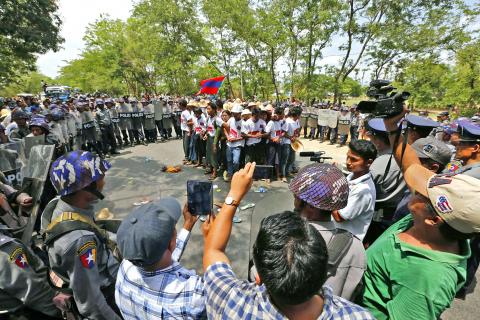About 50 Burmese factory workers and activists involved in a protest march that ended in scuffles with security forces this week have been charged with rioting, police said yesterday.
The latest move by authorities to punish demonstrators from recent rallies comes despite efforts by Aung San Suu Kyi’s new civilian-led government to amend draconian protest laws as the country tries to shake off the repressive legacy of the former junta.
The labor protesters were on Wednesday blocked by a wall of police as they tried to complete an unauthorized march into the capital, Naypyidaw. They had walked for three weeks in searing temperatures from the northern Sagaing Region, where about 100 workers have recently been fired from a timber factory.

Photo: EPA
Scuffles broke out as they were detained.
Authorities said they had initially planned to charge just the rally leaders, but the remaining demonstrators had insisted on all being prosecuted together.
“Now around 50 of them have been charged with ... joining in or continuing an unlawful assembly and rioting,” Naypyidaw region police head Ko Ko Aung said.
He told reporters that authorities had banned the march into the capital on the grounds of national security.
About 20 other protesters were sent home soon after the police clampdown.
Naypyidaw was built 10 years ago in remote tropical scrubland by Myanmar’s former military rulers.
It is still considered a stronghold of the army, despite playing host to the country’s parliament and its first elected civilian government in half a century.
Aung San Suu Kyi’s party is stacked with former dissidents who served prison time for their opposition to Myanmar’s military governments.
Since taking the helm following a landslide election victory in November last year, the administration has freed scores of activists and political prisoners and signaled its determination to repeal oppressive laws.
However, rights groups have expressed concern over efforts to amend the Peaceful Assembly Act, fearing it could continue to penalize non-violent demonstrations, albeit with shorter jail terms.
Lawmakers debated the amendment in parliament on Thursday calling for further changes, but have not yet voted on the issue.
Earlier this week police officials announced plans to take action against five leaders of an interfaith rally in Yangon, because the campaigners had deviated from the agreed protest route.
Yangon police have also begun legal action against seven leaders of an unauthorized protest by Buddhist nationalists outside the US embassy last month.

MONEY GRAB: People were rushing to collect bills scattered on the ground after the plane transporting money crashed, which an official said hindered rescue efforts A cargo plane carrying money on Friday crashed near Bolivia’s capital, damaging about a dozen vehicles on highway, scattering bills on the ground and leaving at least 15 people dead and others injured, an official said. Bolivian Minister of Defense Marcelo Salinas said the Hercules C-130 plane was transporting newly printed Bolivian currency when it “landed and veered off the runway” at an airport in El Alto, a city adjacent to La Paz, before ending up in a nearby field. Firefighters managed to put out the flames that engulfed the aircraft. Fire chief Pavel Tovar said at least 15 people died, but

LIKE FATHER, LIKE DAUGHTER: By showing Ju-ae’s ability to handle a weapon, the photos ‘suggest she is indeed receiving training as a successor,’ an academic said North Korea on Saturday released a rare image of leader Kim Jong-un’s teenage daughter firing a rifle at a shooting range, adding to speculation that she is being groomed as his successor. Kim’s daughter, Ju-ae, has long been seen as the next in line to rule the secretive, nuclear-armed state, and took part in a string of recent high-profile outings, including last week’s military parade marking the closing stages of North Korea’s key party congress. Pyongyang’s official Korean Central News Agency (KCNA) released a photo of Ju-ae shooting a rifle at an outdoor shooting range, peering through a rifle scope

South Korea would soon no longer be one of the few countries where Google Maps does not work properly, after its security-conscious government reversed a two-decade stance to approve the export of high-precision map data to overseas servers. The approval was made “on the condition that strict security requirements are met,” the South Korean Ministry of Land, Infrastructure and Transport said. Those conditions include blurring military and other sensitive security-related facilities, as well as restricting longitude and latitude coordinates for South Korean territory on products such as Google Maps and Google Earth, it said. The decision is expected to hurt Naver and Kakao

India and Canada yesterday reached a string of agreements, including on critical mineral cooperation and a “landmark” uranium supply deal for nuclear power, the countries’ leaders said in New Delhi. The pacts, which also covered technology and promoting the use of renewable energy, were announced after Indian Prime Minister Narendra Modi and Canadian Prime Minister Mark Carney hailed a fresh start in the relationship between their nations. “Our ties have seen a new energy, mutual trust and positivity,” Modi said. Carney’s visit is a key step forward in ties that effectively collapsed in 2023 after Ottawa accused New Delhi